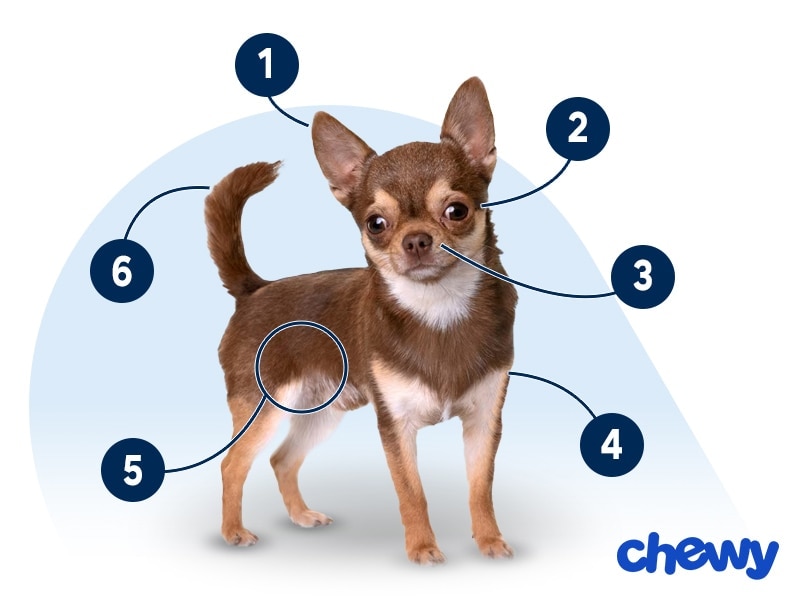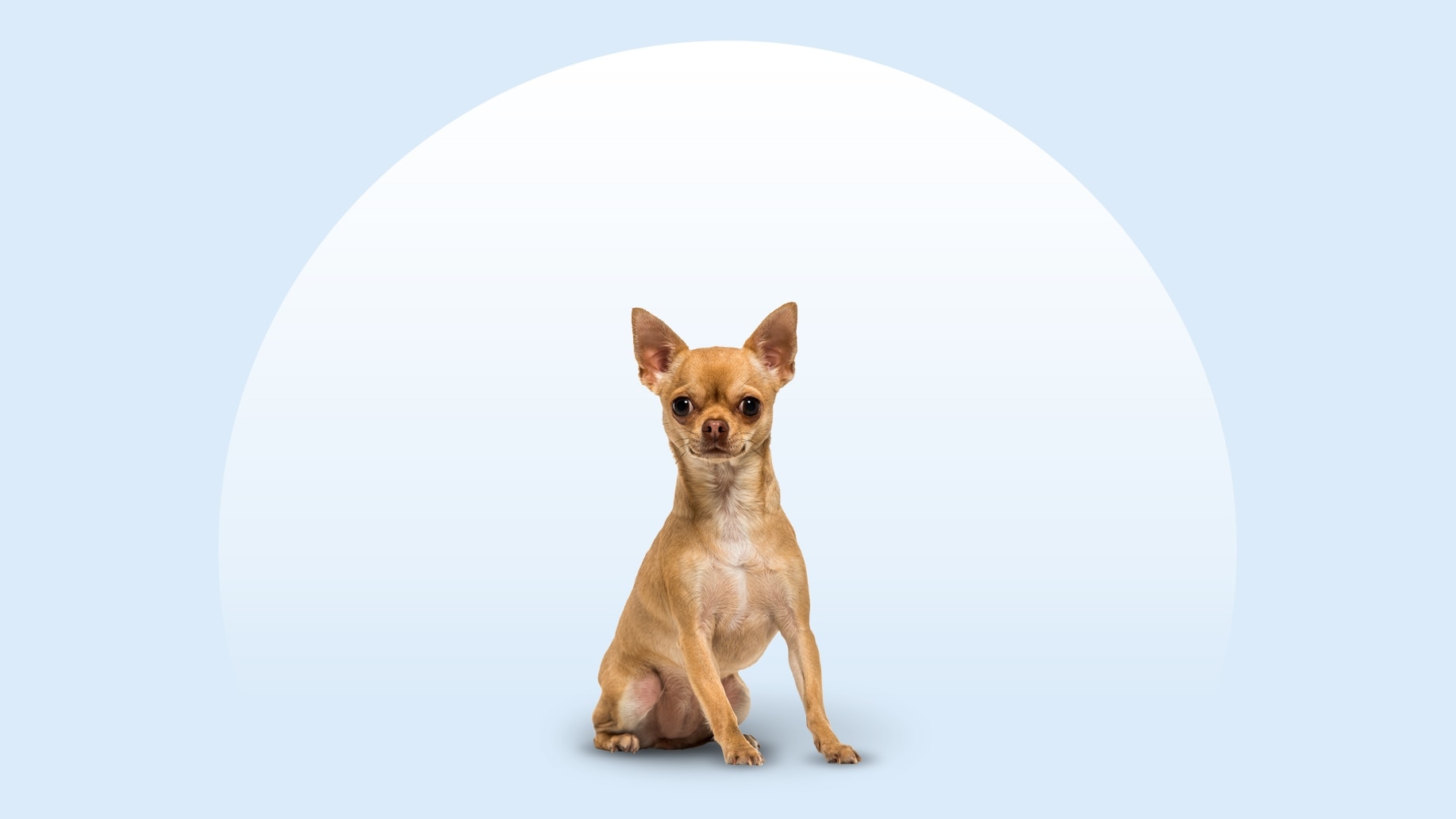Chihuahua
Updated December 15, 2025
Chihuahua
Updated December 15, 2025
Chihuahuas are small, adaptable pups that love to be the star of the show. Their ideal pet parent will have plenty of time for snuggles, help them get a healthy amount of exercise, and won’t mind giving them a lift sometimes—after all, Chis are pretty portable and would love to tag along on your daily errands.
Charismatic, Chatty, Cheeky
4–6 pounds
6–9 inches
14–16 years
Black, Black and Tan, Blue and Tan, Chocolate, Chocolate and Tan, Cream, Fawn, Fawn and White, Red
These pint-sized nuggets are both cheerful sprinters and lazy lap dogs, with soulful eyes and a powerful voice to match. If Chihuahuas were human, they’d probably have their own podcast—they love the sound of their own voice and will likely express whatever they’re feeling. (But hey, if you were this adorable, you’d probably be shouting about it, too.)
Early and consistent socialization and training can help them relax, and regular exercise is a must, too—even if these cuties are compact enough to carry everywhere.
Chihuahua Characteristics
Chihuahua Appearance
One of the tiniest dog breeds, the Chihuahua (or “Chi” for short) has a head that’s either shaped like an apple (apple-head Chihuahuas) or a deer (deer-head Chihuahuas), expressive ears, a short and slightly pointed muzzle, and large eyes that practically burst with emotion. Dainty yet sturdy, they can have short or long hair in nearly any fur color you can think of.

- Ears
A Chihuahua's ears are large and upright when alert, with a little more space between them when relaxed. If their ears are down, it’s a sign that they’re being submissive or they’re scared.
- Eyes
Their eyes are round and usually dark, though some Chis may have lighter eyes.
- Nose
These adorable noses come in a range of colors; they’re either black or the same color as their coat, in blonds, reds, blues, and chocolates. In light-colored and white Chihuahuas, the nose might also be pink or tan.
- Coat Length
A Chihuahua has two coat types: smooth and long. Smooth Chihuahua coats are short and glossy with a ruff on the neck. Long-haired Chihuahua coats are flat or wavy, with a soft texture, an undercoat, “pants” on their hind legs, and a large ruff on the neck.
- Coat Color
Chis have nearly 30 coat colors and combinations, including black, blue and tan, chocolate, cream, fawn and white, red, and more. Their fur might be solid, marked, brindled, sable, or splashed.
- Tail
Chis with a short coat are more likely to have a furry tail. If their coat is long, it’ll be plumed with feathering.
Chihuahua Temperament
Chihuahuas are little charmers with a knack for mischief and a sense of bravery that belies their tiny size. Playful pups that enjoy a good romp or game, they also love to snooze on laps and cuddle.
Chis bask in a lot of attention and are quite portable. But even though they’re easily carried, they still need to engage in normal dog behaviors, like sniffing, exploring the outdoors, and playing. In other words, don’t make it your default to pop them in a purse or a stroller—unless, of course, you’re somewhere busy that could hurt a tiny paw, like an airport or street festival.
Despite their tiny stature, these dogs are not afraid to tell you what they think, especially if they feel like they’re in danger. Socialize them by safely and slowly introducing them to new people and places from the get-go, and train them when they’re young so they don’t sound the alarm at everything.
Early training will also help this smallest of dog breeds become friendly and receptive to new people and animal friends.
How to Care for a Chihuahua
It’s easy to think of these pups as low maintenance since they’re so tiny. But cute Chihuahuas require daily exercise, regular grooming, and early socialization and training. Popular culture has at times portrayed them more like accessories than dogs, but they have the same essential needs as dogs five times their size.
Grooming
Training
Diet
Exercise
Environment
Chihuahua Health
A Chihuahua lifespan is an impressive 14–16 years, but they’re not without some health problems. Purchasing pet insurance may be a good idea when bringing home a Chihuahua puppy.
- Bladder stones: Small breeds could be more prone to bladder stones. Symptoms include smelly or bloody urine, inability to urinate, frequent urination, and accidents in the house; bring these to a vet’s attention immediately.
- Epilepsy: Seizures have various causes, but if there’s no underlying disorder, idiopathic epilepsy will likely be diagnosed. This is managed with lifelong daily meds.
- Eye issues: Those big, sparkling eyes make Chis more prone to problems, like keratoconjunctivitis sicca (dry eye), glaucoma, cataracts, and corneal ulcers. Redness, cloudiness, squinting, bulging, or pain require immediate vet attention.
- Heart trouble: One study names heart disease as the leading cause of death for this tiny breed. Chihuahuas are also susceptible to mitral valve disease and patent ductus arteriosus. Your Chihuahua may need an echocardiogram (ultrasound of the heart) for a diagnosis.
- Hydrocephalus: Due to their head shape, Chihuahuas are susceptible to hydrocephalus, or improperly fused skull bones that can lead to excess fluid around the brain, resulting in extra intracranial pressure. Symptoms include seizures, circling, and an improper gait; when caught early, medication can treat the condition.
- Hypoglycemia: Tiny dogs have very little fat storage, so their blood sugar bottoms out easily, making them prone to hypoglycemia, also known as low blood sugar. STo avoid hypoglycemia, offer your Chi multiple small meals throughout the day and ask your vet if a high-calorie supplement is a good idea for your pup.
- Luxating patella: Luxating patella occurs when the kneecaps slip or dislocate. Treatment may be joint supplements, medication, physical therapy, or surgery.
- Dental disease: Extremely common in Chihuahuas by the age of 2, periodontal disease begins with tartar buildup and leads to gum infections, abscesses, and tooth loss. If not treated, oral bacteria can get in the bloodstream and affect the heart, liver, and kidneys. Daily brushing and regular dental checkups are key to prevention.
- Portosystemic shunt (PSS): In PSS, the blood supply that’s supposed to go to the liver is shunted or diverted, causing toxin buildup. If your Chihuahua isn’t growing properly or has seizures, ask your vet about this condition.
Chihuahua History
Named after the Mexican state of Chihuahua, these pups originated there and may have developed from the Techichi, a tiny dog kept by the Toltecs as early as the ninth century. In an ironic twist, the Techichi dog was mute—something their Chihuahua relative is definitely not.
The American Kennel Club (AKC) officially recognized Chihuahuas as a breed in 1904, but it wasn’t until nearly a decade later when they became popular.
Beginning in the 1990s, with a series of Taco Bell commercials, Chihuahuas cemented a place in popular culture. Celebrities, too, began to be seen with these pups. And while all the attention might have seemed like a good thing, it also meant that some people saw these dogs as just a cute accessory or fad and not the deserving, multifaceted pups they truly are.
A Chihuahua puppy from a breeder costs anywhere from $500 to $1,500. If you choose to purchase a puppy, pick a responsible breeder.
There are also many Chihuahuas in shelters waiting for the perfect forever family. If you’re looking to adopt a Chihuahua, reach out to Chihuahua rescue organizations, keep an eye out for the breed at your local animal shelter, or search Chewy’s database of adoptable dogs in your area. Your perfect (and petite!) match is out there.








